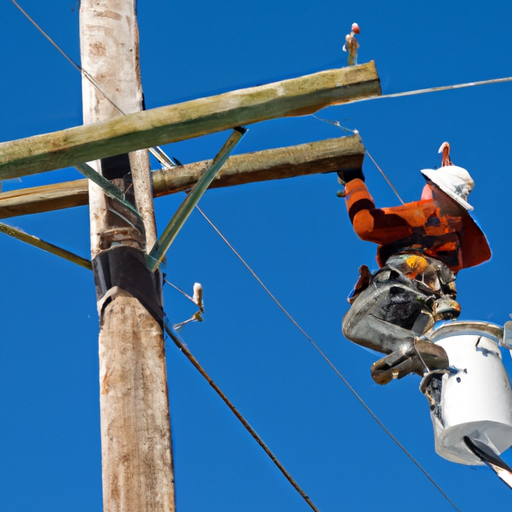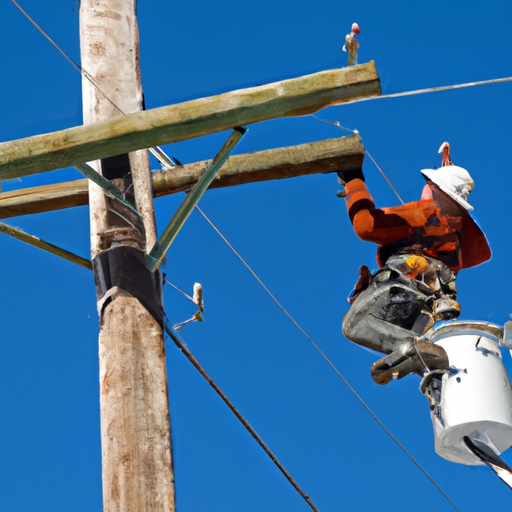So you’re curious about what linemen actually do in the electrical industry? Well, you’ve come to the right place! In this article, we’re going to delve into the world of linemen and explore their crucial role in keeping the power flowing.
If you’ve ever wondered how electricity gets from power plants to your home or business, linemen are the unsung heroes who make it all happen. They are responsible for installing, repairing, and maintaining the complex network of power lines that stretch across cities and towns. But their job goes beyond just working with high voltage wires. Linemen also ensure that electrical equipment is safely grounded, troubleshoot issues, and even perform emergency repairs during outages. Intrigued? Well, keep reading to learn more about the fascinating and vital work of linemen in the electrical industry.
Introduction to Linemen
Linemen play a critical role in the electrical industry, ensuring that power lines are installed, maintained, and repaired to deliver electricity to homes, businesses, and communities. Their expertise and skills are essential for keeping the electrical grid running smoothly and safely. In this article, we will explore the role of linemen in detail, from their training and qualifications to their responsibilities, challenges, and the impact they have on the electrical grid and society as a whole.
Definition of a Lineman
A lineman is a skilled professional who works with electrical power systems, primarily focusing on the installation, maintenance, and repair of power lines. They are also known as powerline technicians, and their work involves both indoor and outdoor tasks. Linemen are typically employed by electrical utility companies or contractors and are responsible for ensuring the reliable delivery of electricity to consumers.

Importance of Linemen in the Electrical Industry
The electrical industry heavily relies on the expertise and dedication of linemen. They are the ones who build and maintain the intricate network of power lines that supply electricity to our homes, businesses, and public infrastructure. Without linemen, the electrical grid would be vulnerable to disruptions and power outages, impacting our daily lives and the functioning of essential services.
Training and Qualifications
Becoming a lineman requires a combination of educational requirements, apprenticeship programs, and the acquisition of specific skills and certifications. Let’s delve into each aspect in more detail.
Educational Requirements
While a high school diploma or equivalent is often required, some linemen pursue vocational courses or community college programs in electrical systems or related fields. These educational programs provide a foundational understanding of electrical systems, safety protocols, and the technical aspects of the job.
Apprenticeship Programs
After completing the necessary educational requirements, aspiring linemen typically enter apprenticeship programs. These programs provide hands-on training under the supervision of experienced linemen. Apprentices learn the practical aspects of the job, such as climbing poles, working with electrical equipment, and understanding power distribution systems. Apprenticeships also offer valuable opportunities to develop teamwork, problem-solving, and communication skills.
Skills and Certifications
To excel as a lineman, various skills are required, including physical fitness, problem-solving abilities, and technical know-how. Linemen must be comfortable working at heights and possess excellent hand-eye coordination. In addition to these skills, linemen may also acquire certifications in areas such as pole climbing, first aid, and CPR, ensuring they are well-prepared to handle emergencies and work safely.

Responsibilities of Linemen
The responsibilities of linemen are broad-ranging, encompassing everything from the installation and maintenance of power lines to repairing the electrical grid. Let’s dive into these responsibilities in more detail.
Installation and Maintenance of Power Lines
One of the primary roles of a lineman is the installation of power lines. This involves working with a team to string overhead wires, connect transformers, and install other necessary electrical equipment. Attention to detail and adherence to safety protocols are crucial during these installation processes to ensure the power lines are installed correctly and can withstand various weather conditions.
Maintenance of power lines is equally important for linemen. They regularly inspect the lines, troubleshoot any issues, and carry out repairs or replacements of damaged equipment. Proactive maintenance helps prevent potential electrical failures, reducing the risk of power outages and ensuring a reliable electricity supply.
Repairing Electrical Grid
When electrical disruptions occur, linemen are responsible for identifying and rectifying the issues promptly. They employ diagnostic techniques to identify faults in the electrical grid, such as damaged power lines or faulty transformers. Once the problem is identified, linemen work efficiently to repair or replace the faulty components, restoring power to the affected areas. Their expertise and quick response are crucial in minimizing the duration and impact of power outages.
Climbing and Working at Heights
Linemen must be adept at climbing poles and working at heights, as their work often requires them to operate on utility poles or transmission towers. They use specialized equipment, such as safety harnesses and climbing gear, to ensure their safety while working at elevated locations. Climbing and working at heights can be physically demanding, requiring linemen to stay fit and agile to perform their tasks effectively.
Safety Measures and Equipment
Safety is of paramount importance in the lineman profession, given the potential hazards associated with working with electricity and at heights. Linemen undergo extensive safety training and adhere to strict procedures to minimize the risk of accidents. Let’s explore the safety measures and equipment that linemen rely on to ensure their well-being.
Importance of Safety for Linemen
Linemen face numerous risks while working, including electrical shock, falls, and exposure to hazardous materials. It is vital for them to understand and implement safety protocols to protect themselves and their colleagues. Safety is not just about individual well-being, but also about ensuring uninterrupted power supply to consumers and preventing accidents that could result in the loss of life or property.
Personal Protective Equipment (PPE)
Linemen utilize various personal protective equipment to mitigate risks and safeguard themselves. This equipment includes safety helmets, protective eyewear, insulated gloves, flame-resistant clothing, and safety boots. PPE provides linemen with an additional layer of protection against electrical shocks, fires, and other potential hazards at the worksite.
Safety Training and Procedures
Before performing any job tasks, linemen undergo comprehensive safety training that covers topics such as electrical safety, fall protection, emergency response, and hazard recognition. They learn how to assess risks, use safety equipment correctly, and work in a manner that minimizes the likelihood of accidents. Regular safety meetings and ongoing training help linemen stay updated on the latest safety practices and regulations.
Challenges Faced by Linemen
Being a lineman presents unique challenges that require individuals to be resilient, adaptable, and dedicated to their work. Let’s explore some of the common challenges faced by linemen in the field.
Working in Adverse Weather Conditions
Linemen often find themselves working in challenging weather conditions, including extreme heat, strong winds, rain, and snow. These adverse weather conditions can make their tasks more difficult and hazardous. Despite the challenges, linemen must continue to work diligently to restore power and ensure the safety and comfort of the communities they serve.
Dealing with Power Outages
Power outages can occur unexpectedly due to various reasons such as storms, equipment failures, or accidents. Linemen are often called upon to respond quickly and efficiently to restore power during these outages. The pressure to work swiftly, particularly during large-scale outages, can be demanding for linemen, who must prioritize safety while working against the clock to get the electricity flowing again.
Physical Demands of the Job
Working as a lineman requires physical fitness and stamina. The job entails heavy lifting, climbing poles or towers, and being exposed to various physical demands. Linemen must maintain their physical well-being and engage in regular exercise to stay fit, ensuring they can perform their duties effectively and reduce the risk of injuries on the job.
Career Opportunities and Advancement
The lineman profession offers various career opportunities and the potential for advancement within the electrical industry. Let’s explore these opportunities and the pathways to career growth for linemen.
Different Job Roles in the Electrical Industry
Within the electrical industry, linemen can pursue different job roles that align with their skills and interests. Some linemen may choose to specialize in areas such as overhead line construction, underground cable installation, or substation maintenance. Others may transition into leadership roles, such as foremen or supervisors, overseeing teams of linemen and managing complex electrical projects.
Advancement and Promotional Opportunities
Linemen who demonstrate exceptional skills, experience, and leadership qualities may have opportunities for advancement within their organizations. Advancement may involve taking on higher-level positions, such as operations managers or project managers, where linemen can leverage their expertise and experience to oversee broader aspects of electrical systems and operations.
Specialization Options
The electrical industry continues to evolve, and linemen can choose to specialize in emerging areas of expertise. Specializations may include renewable energy systems, smart grid technologies, or electrical system automation. By developing specialized knowledge, linemen can position themselves for future career growth and contribute to the industry’s ongoing advancements.
Impact on the Electrical Grid and Society
Linemen’s contributions extend far beyond their day-to-day tasks. Let’s explore the significant impact linemen have on the electrical grid and the broader society.
Ensuring Reliable Power Supply
The work of linemen ensures the reliable supply of electricity to homes, businesses, and essential services. Their expertise in maintaining and repairing power lines helps minimize outages and ensures that consumers have access to uninterrupted power. Without linemen, the daily functioning of society would be severely impacted, affecting everything from healthcare facilities to communication networks.
Contribution to Infrastructure Development
As communities expand and infrastructure needs evolve, linemen play a crucial role in the construction and expansion of power distribution systems. They are involved in the planning and installation of new power lines and substations, enabling the growth of cities and towns. Linemen’s contributions to infrastructure development are instrumental in supporting economic growth and improving the standard of living for communities.
Emergency Response and Disaster Management
During natural disasters or emergencies, linemen are at the forefront of restoring power and aiding in disaster management efforts. They are often among the first responders, ensuring that critical facilities such as hospitals, emergency shelters, and communication centers have access to electricity. Linemen’s quick response and ability to work efficiently under challenging conditions are essential in mitigating the impact of disasters and helping communities recover.
Technological Advancements in the Field
The electrical industry is continuously evolving, with new technologies and innovations shaping the way linemen carry out their work. Let’s explore some of the technological advancements that are impacting the lineman profession.
Smart Grid Technology
Smart grid technology introduces advanced monitoring and control systems that enable real-time information exchange between power suppliers and consumers. This technology allows linemen to remotely monitor the electrical grid, detect faults, and analyze power consumption patterns. Smart grid technology enhances efficiency, reliability, and the ability to respond quickly to power outages and fluctuations in demand.
Use of Drones and Robotics
Drones and robotics are increasingly being used by linemen for inspections and maintenance tasks. Drones equipped with cameras and sensors can conduct aerial inspections of power lines, identifying potential issues without the need for climbers. Robotics can assist linemen in performing physically demanding tasks, such as lifting heavy equipment or working in confined spaces. These technological advancements enhance safety, efficiency, and overall job performance.
Digitalization and Automation
Digitalization and automation are transforming various aspects of the lineman profession. Advanced software applications help optimize power distribution systems, streamline work processes, and facilitate better asset management. Automation tools enable tasks such as fault location and isolation, minimizing the need for manual intervention and expediting repairs. Linemen must adapt to these technological changes and acquire the necessary skills to leverage these tools effectively.
Job Outlook and Salary
The job outlook for linemen remains strong due to the ongoing demand for reliable electricity and the expansion of the electrical infrastructure. As the population grows and energy demands increase, the need for skilled linemen will continue to rise. The salary of linemen can vary depending on factors such as experience, qualifications, and location. However, linemen typically earn competitive salaries that reflect the importance and specialized nature of their work.
Conclusion
Linemen play a crucial role in the electrical industry, ensuring the smooth and safe operation of the electrical grid. From installing and maintaining power lines to repairing the electrical system during outages, linemen work diligently to ensure the reliable supply of electricity. Their dedication, skills, and expertise contribute to infrastructure development, emergency response efforts, and the continuous advancement of the electrical industry. With ongoing technological innovations and a growing need for reliable electricity, the role of linemen remains vital now and in the future.




